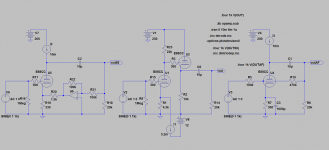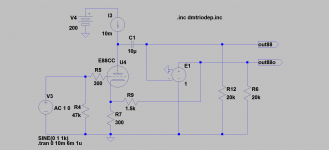Hey,
Have anyone tried the leftmost topology before? This one is with E88CC feedbacked to get 12dB gain. The opamp acts as inverter.
Another singletube alternative is anode-follower but you are then restrictied to low Zin and lower upper bandwith
In the middle example you must add a CF to get an acceptable Zout.
Note this is not yet a working cicuit, only a topology idea!
Have anyone tried the leftmost topology before? This one is with E88CC feedbacked to get 12dB gain. The opamp acts as inverter.
Another singletube alternative is anode-follower but you are then restrictied to low Zin and lower upper bandwith
In the middle example you must add a CF to get an acceptable Zout.
Note this is not yet a working cicuit, only a topology idea!
Attachments
Last edited:
You do realise that the whole point of negative feedback is that a resistor has much less distortion than an active device? Putting active devices in the feedback chain seems perverse.
If opamps are good enough for audio, then use an opamp and ditch the valve. If not, ditch the opamp.
If opamps are good enough for audio, then use an opamp and ditch the valve. If not, ditch the opamp.
At that point, what function does the tube actually have, other than increasing heat, distortion, and parts count? Just use the opamp.
If you want a 12dB ECC88 line stage, run the first stage as a CCS loaded voltage amp, use a high value resistor voltage divider, followed by a cathode follower (or your opamp configured as a unity gain buffer).
If you want a 12dB ECC88 line stage, run the first stage as a CCS loaded voltage amp, use a high value resistor voltage divider, followed by a cathode follower (or your opamp configured as a unity gain buffer).
SY,
As you seem to know the answer of what is wrong, why not give an explanation instead of just diss the idea?
Oooops, seems like you all get provocated by an OP-amp .
.
Still noone have said what is so wrong with the topology if we assume an ideal inverter.
To make it easier for you, lets use an ideal inverter in the same circuit. Now with two outputs, before and after the "black box".
As you seem to know the answer of what is wrong, why not give an explanation instead of just diss the idea?
Oooops, seems like you all get provocated by an OP-amp
Still noone have said what is so wrong with the topology if we assume an ideal inverter.
To make it easier for you, lets use an ideal inverter in the same circuit. Now with two outputs, before and after the "black box".
Attachments
SY,
Off course it will work, anyone can tell. But as you seem to know it is pointless, why not explain?
DF96,
Grumpy today, are we?
It's like using a framing hammer to nail tacks. Of course it will work, but it is a waste of hammer.
In your case you add an op amp, but you also need a power supply for that amp. All that to replace a resistor? Why is an op amp superior?
Loren 42,
Since when can you get NFB with a resistor from anode to cathode? That makes PFB in my book!
Can´t find those words in my electronic dictionary. Why not explain in electronic terms instead?
Since when can you get NFB with a resistor from anode to cathode? That makes PFB in my book!
It's like using a framing hammer to nail tacks. Of course it will work, but it is a waste of hammer.
Can´t find those words in my electronic dictionary. Why not explain in electronic terms instead?
Moi, grumpy? No, I am amused. Several of us have tried to explain why it is a bad idea, yet you seem unconvinced. If you don't welcome comments, why post your idea?
Not grumpy, hmm? Don´t know where you found your info, but of the above posts there is noone who have even tried to explain. Certainly not you! To say that "an active device in a feedback loop is perverse" is no explanation, neither that a "resistor has lower distortion than an active device".
So why not try again.
It might be boring to repeat myself. Re-read the thread, including the pieces you have quoted from me. If you don't recognise any explanation then I don't think we can help you.revintage said:Don´t know where you found your info, but of the above posts there is noone who have even tried to explain. Certainly not you! To say that "an active device in a feedback loop is perverse" is no explanation, neither that a "resistor has lower distortion than an active device".
So why not try again.
I check there out of stock and have been discontinued . They however have promised a digital version that is said to be better than ideal and lower noise.Could someone remind me what the Farnell part number is for an "ideal inverter"?
DF96, for someone with internet access you have a refreshingly innocent idea of "perverse" !
As Wavebourn points out, "with -1 gain opamps work pretty nice".
None of the naysayers are actually coming up with noise figures for this topology versus another that offers high z-in using a single valve, perhaps they might care to do so? Quantification before condemnation might be sensible.
As for distortion, it comes in two flavours, the sound the user likes and the one he doesn't. This doesn't in any case look like it's going to suffer overly from noise or distortion, given a sane implementation, so to dismiss it as 'pointless' seems both arrogant and rude to me - a shame to see that attitude from a moderator, SY.
On a practical note, it might be worth protecting the inputs of the op-amp from their max differential voltage being exceeded as C2 charges at switch on.
As Wavebourn points out, "with -1 gain opamps work pretty nice".
None of the naysayers are actually coming up with noise figures for this topology versus another that offers high z-in using a single valve, perhaps they might care to do so? Quantification before condemnation might be sensible.
As for distortion, it comes in two flavours, the sound the user likes and the one he doesn't. This doesn't in any case look like it's going to suffer overly from noise or distortion, given a sane implementation, so to dismiss it as 'pointless' seems both arrogant and rude to me - a shame to see that attitude from a moderator, SY.
On a practical note, it might be worth protecting the inputs of the op-amp from their max differential voltage being exceeded as C2 charges at switch on.
- Status
- This old topic is closed. If you want to reopen this topic, contact a moderator using the "Report Post" button.
- Home
- Amplifiers
- Tubes / Valves
- Single stage line with anode-cathode feedback

